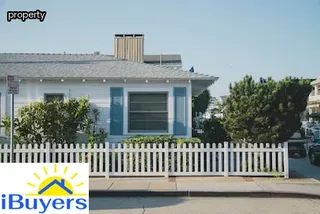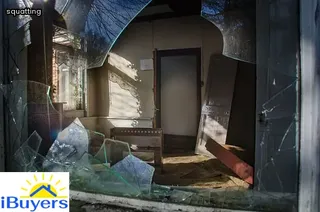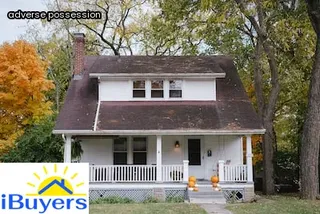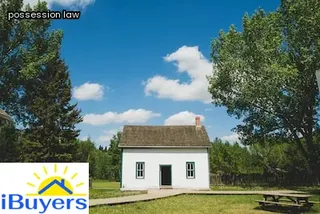Adverse possession is a legal principle that allows people to acquire ownership of a property without the permission of the original owner. This concept is particularly relevant in states like Washington, where housing laws grant squatters the right to claim ownership of a property they have been occupying for a specified amount of time.
To be eligible for adverse possession, a squatter must prove that they are in continuous and exclusive occupation of the property and must also demonstrate an intent to possess it as their own. Additionally, the squatter must have paid any taxes or other dues associated with the property for the duration of their occupancy.
In some cases, squatters may also be required to show proof of open and notorious occupation. If all these requirements are met, then Washington state law gives squatters the right to gain title to the property through adverse possession.

Squatting in Washington State is defined as occupying or otherwise using a space, such as a building, without the authorization of the owner. This unauthorized occupation can be for any amount of time, from a few days to years at a time.
The practice of squatting is not unique to Washington; however, it does have different meanings and implications depending on the state. In Washington State, squatters may find themselves subject to civil as well as criminal penalties for their unauthorized use of space.
Squatters may also have certain rights, including the right to remain on the property until they are evicted by court order, or until they are granted permission by the owner. The laws governing squatters in Washington vary widely and can be complicated; it is essential that anyone considering squatting in Washington familiarize themselves with all relevant legislation before taking any action.
The best way to deter squatters from occupying your property is to ensure that all of the typical entry points are properly secured. Make sure that any doors, windows, and other entrances to the property are locked with sturdy locks and deadbolts.
Additionally, you should also consider installing security cameras or motion-activated lighting around the perimeter of your property as a deterrent. If squatters have already taken up residence in your home or on your land, you can pursue legal action against them depending on the laws in Washington where you live.
However, it is important to note that many of these laws vary from state to state, so it is recommended that you consult with an experienced attorney for help understanding and enforcing your rights as a homeowner or landowner under the law.

Squatting in Washington is illegal, and those found guilty of engaging in the practice face a number of potential penalties. Depending on the severity of the violation, squatters may be subject to criminal charges or civil lawsuits.
Criminal cases can result in fines and/or jail time, while civil cases can lead to judgments for restitution or damages for any losses incurred by the owner. In addition, those who are caught squatting may be evicted from the property and barred from returning.
It is important for anyone considering squatting to familiarize themselves with all applicable laws before taking such drastic action.
Proving squatter tenancy in Washington can be a tricky and time-consuming process. It requires individuals to be knowledgeable about housing laws and the legal system, as well as the status of their residence.
The most important step for proving squatter tenancy is to provide evidence that you have established a physical presence in the home, such as by paying bills or utilities or having furniture in the residence. Additionally, squatters must demonstrate that they had an intention to remain in the home, like taking steps to repair or maintain it.
It is also beneficial to show that rent has been paid or that permission was granted from the owner of the property. Furthermore, it is wise for squatters to register with local government offices where possible and seek legal advice if needed.
With all this information, individuals can prove their right to stay in Washington homes despite not having an official lease agreement.

When it comes to squatting in Washington, the color of title is an important factor that must be taken into consideration. Simply put, a color of title is a document which shows an individual's legal right to occupy and possess property.
Without this document, it is often very difficult for squatters to establish their rights over the land they are occupying. Generally speaking, as long as a squatter has been living on the property for at least seven years and has made significant improvements or repairs to the land, they may be able to establish ownership without a color of title.
However, this can be complicated depending on the exact circumstances and laws in place. Ultimately, when exploring squatter's rights in Washington State it is important to understand whether or not a color of title is necessary for squatting on someone else’s land.
In Washington, a holdover tenant is someone who remains in a rental property after the lease has expired. In some cases they are legally allowed to stay while in others they become trespassers.
To determine whether or not a tenant has become a trespasser, the relevant housing laws must be taken into consideration. Generally speaking, if the landlord gives notice that the tenancy is terminated and the tenant does not leave within the specified time period listed in the notice or as described in applicable law, then they are considered a trespasser.
Additionally, if the landlord begins eviction proceedings and a court order is issued stating that the tenant must vacate by a certain date, and they fail to do so, then they are also deemed to be a trespasser. If a holdover tenant continues to remain on the property without permission from their landlord or authorization from an applicable court order, then they can be subject to legal action for trespassing.

When exploring squatter's rights in Washington, it is important to understand the laws related to rent and property taxes. In general, squatters are not required to pay rent or property taxes; however, there are exceptions that may apply in certain situations.
For example, if a squatter enters into an agreement with the owner of the property, then they may be responsible for paying rent or other fees associated with occupying the space. Additionally, if a squatter has been occupying a property for an extended period of time (such as five years or more) and can prove that they have been using the land openly and adversely, then they may be able to claim adverse possession of it.
In this case, they could potentially be liable for paying property taxes on the land. Ultimately, it is essential to understand the relevant laws when considering squatters rights in Washington so that you can make informed decisions regarding your housing situation.
In Washington, the process for the removal of a squatter involves an official court hearing. Squatters in Washington can be removed from a property through an unlawful detainer action initiated by the rightful owner of the property.
The landlord must file a complaint with their local court to initiate a hearing and provide proof that they are the rightful owner of the property. The court will then issue an order to show cause, which requires the squatter to appear at a hearing and explain why they should not be removed.
At this hearing, both parties present evidence and arguments before the judge makes a ruling on whether or not to evict the squatter. If it is determined that the squatter has no legal claim over the property, they will be legally evicted by law enforcement officers and removed from the premises.
In some cases, when appropriate, an attorney may be appointed to represent either party during these proceedings.

In Washington State, trespassing laws are generally fairly strict, but there are a few exceptions that relate to squatters' rights. In some cases, a squatter may be protected from eviction if they have been living in the same place for at least seven years and have made substantial improvements to the property.
If a squatter has also paid property taxes or has made payments to someone with legal claim to the property during their time there, they may also be able to assert ownership rights over it. Additionally, there is an implied license exception in Washington that holds that if someone other than the legal owner of the property grants permission for another person to stay on it for an extended period of time, that person may be able to claim squatter's rights after a certain amount of time has passed.
As these exceptions can vary based on individual circumstances, it's important for anyone exploring their options as a squatter in Washington understand all applicable laws as they apply in their situation.
In Washington, a landlord is required to give written notice to a squatter before filing an eviction. This notice must include the amount of time the squatter has to vacate the premises, which is typically three days.
It should also detail how the squatter can contest the eviction and provide an explanation as to why they are being evicted. If a squatter does not receive written notice from their landlord, they have the right to contest the eviction in court.
Furthermore, if a landlord does not follow proper procedures or fails to provide adequate written notice prior to filing for eviction, then any subsequent court proceedings may be nullified in favor of the squatter. Understanding these legal requirements is essential for both landlords and squatters living in Washington in order to ensure rights are protected and respected.
In Washington state, squatters have specific rights under the law. Squatters are individuals who occupy a piece of property without permission or legal right.
As long as certain conditions are met, squatters can establish legal rights to a property. The Washington Legislature has established a set of laws that contain both criminal and civil provisions pertaining to squatting.
These laws provide guidance on what rights a squatter may have in the state of Washington. Generally speaking, if someone has been occupying a property for at least seven years without permission from the owner, they may be able to claim adverse possession of the property and acquire title under certain circumstances.
In addition to adverse possession, there are other ways for squatter's rights to be established in Washington State—including by estoppel and by prescription—which may give squatters certain rights over the property they occupy. It is important for anyone considering becoming a squatter in Washington State to understand their rights before proceeding with occupation of any piece of real estate.

Yes, you can evict a squatter in Washington state. Squatting, or occupying real property without permission or legal right, is illegal in Washington and punishable by law.
Property owners may file an eviction lawsuit in court against a squatter to have them removed from the premises. The eviction process typically involves serving the squatter with an eviction notice detailing the reasons for their removal and giving them a set amount of time to leave voluntarily.
If they fail to do so, then the property owner must file a formal complaint with the court, who will issue an order for their removal. To protect your rights as a property owner, it is important to seek legal advice from an experienced attorney before attempting to evict a squatter in Washington state.
Eviction is the legal process of removing someone from a property, and in Washington state, it can take anywhere from 3 days to several weeks for a squatter to be evicted. In general, it's important to make sure that all applicable laws are followed when evicting a squatter.
Washington State has specific laws dictating how long an eviction may take. These laws provide landlords with options for evicting squatters as quickly and safely as possible.
The length of time it takes to evict a squatter depends on the type of tenancy they have, the type of notice required, and any court proceedings that may need to be filed in order to get the eviction accomplished. Landlords must give tenants at least 3 days' notice before filing for an eviction in court, and squatters must be given 7 days' notice before the landlord can proceed with initiating an eviction.
Landlords may also be able to use special procedures if they are able to prove that their tenant is a squatter or is engaging in illegal activities such as drug use or gang activity on their property. Once an eviction is officially ordered by the court, law enforcement will usually arrive within 48 hours to carry out the eviction process.
After this occurs, it typically takes about 2-3 weeks for all paperwork associated with the eviction process to be completed and finalized by both parties. Ultimately, understanding the specifics of Washington State's housing laws pertaining to squatters can go a long way toward ensuring swift and successful evictions with minimal disruption or potential legal issues down the road.
Yes, a tenant without a lease in Washington state can be evicted. Squatter's rights apply differently in Washington than in other states, and the law is complex.
It is important to understand the housing laws in Washington before attempting to evict a tenant without a lease. Generally speaking, squatters are people who occupy a property that they do not own or rent without permission from the owner.
In Washington, squatters may be able to claim ownership of the property if they can prove that they have lived on it for at least seven years uninterrupted. To evict a squatter without a lease in Washington state, the owner must go through an eviction process.
This process involves filing an unlawful detainer action with the court and having it served on the squatter. The court will then give both parties an opportunity to present their case before ruling on whether or not eviction is necessary.
It is important for owners to understand their rights when it comes to evicting tenants without leases and to follow all steps correctly when pursuing an eviction order from the court. Exploring Squatter's Rights In Washington: A Comprehensive Guide To Housing Laws can help you navigate this complicated legal process and ensure your rights are protected as an owner or landlord.